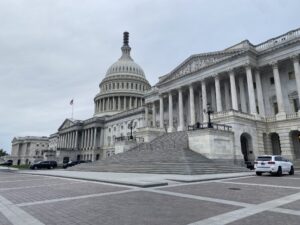13:05
News Story
Missouri voters to decide if the state can dictate increased Kansas City police funding
A new law passed this year aims to raise the minimum portion of Kansas City’s budget devoted to police. To ensure the requirement is legal, a constitutional amendment must go to the voters
If Missouri voters approve Amendment 4 in the Nov. 8 general election, Kansas City will be required to increase funding for its police department.
But many voters may not understand that from the language they’ll see on the ballot.
Amendment 4 reads: “Shall the Missouri Constitution be amended to authorize laws, passed before December 31, 2026, that increase minimum funding for a police force established by a state board of police commissioners to ensure such police force has additional resources to serve its communities?”
There’s only one police department in Missouri, and possibly in the country, that is controlled by the state and not its local city government officials — and that’s the Kansas City Police Department.
A new law passed this year aims to raise the minimum portion of Kansas City’s budget that must be devoted to the police department from 20% to 25% — a $65.2 million increase.
However, the Missouri constitution states that the legislature cannot require a city to increase an activity or service beyond that mandated by existing law, unless a state appropriation is made to pay the city for any increased costs.
Led by Sen. Tony Luetkemeyer, R-Parkville, legislators also passed a proposed constitutional amendment this spring that would provide an exception for the Kansas City Police, if approved by the voters around the state.
Kansas City Mayor Quinton Lucas said the city council already regularly funds the police department above the 25% threshold, so the new mandate will not immediately increase the police budget.
“Instead, the bill represents the raw exercise of power by state lawmakers over the people of Kansas City, as the only people in our state without the ability to influence how one quarter of our budget is spent,” Lucas said in a statement after the governor signed the bill.
Lucas was referring to the fact that Kansas City is the only city in the state where the local elected officials, by law, have almost no authority in how the police department’s budget is spent. A board of commissioners appointed by the governor makes those decisions.
Luetkemeyer pushed for the funding increase after Lucas and some city council members attempted to designate $42 million within the police budget for things like community engagement and intervention. A judge ultimately ruled they didn’t have that authority.
“When a majority of the City Council voted to strip $42 million from KCPD’s budget in 2021, I knew I had to do something to prevent future efforts to defund the police,” Luetkemeyer said in a statement after the bill was signed.
Lucas argues it’s not the council members who have repeatedly “defunded” police salaries — it’s the board of commissioners.
In August, Lucas filed a lawsuit against the state, arguing that the law requiring the city to spend more on police is unconstitutional.
“The radical legislation provides no pay guarantees for our officers,” Lucas said, “will not hire a single police officer, and ignores the will and importance of Kansas City taxpayers, instead attempting to politicize policing in Kansas City at a time we sorely need bipartisan solutions to violent crime.”
A spokesman for Missouri Attorney General Eric Schmitt, a named defendant in the lawsuit whose office will represent the state, said Lucas is putting “politics over public safety.”
“The Attorney General’s Office will continue to support the brave men and women of law enforcement, and we will vigorously defend the laws of the state of Missouri in this case,” said Chris Nuelle, Schmitt’s spokesman. “Missourians deserve to feel safe in their communities, and we will continue to fight to ensure that they are.”
Our stories may be republished online or in print under Creative Commons license CC BY-NC-ND 4.0. We ask that you edit only for style or to shorten, provide proper attribution and link to our website. AP and Getty images may not be republished. Please see our republishing guidelines for use of any other photos and graphics.





